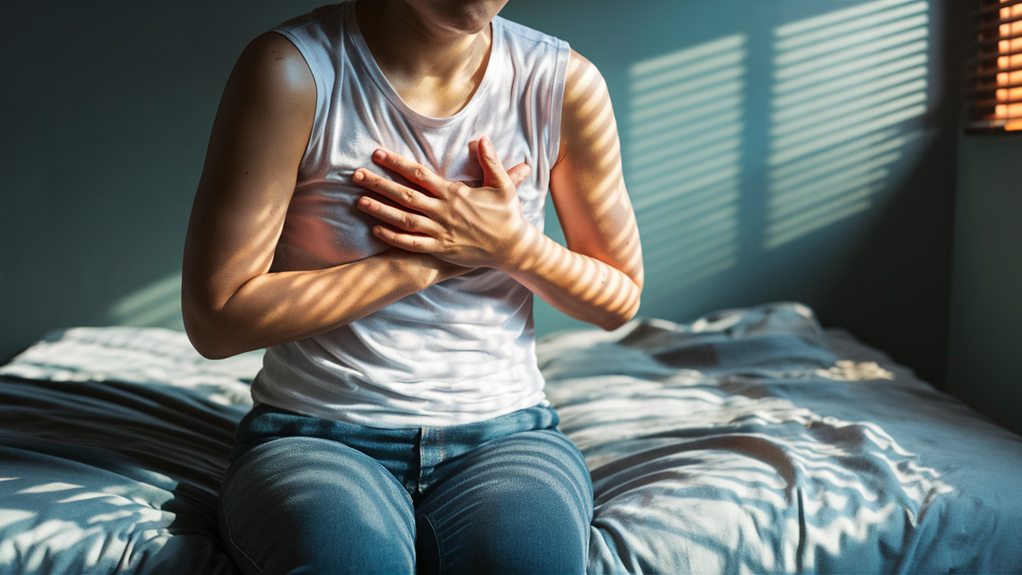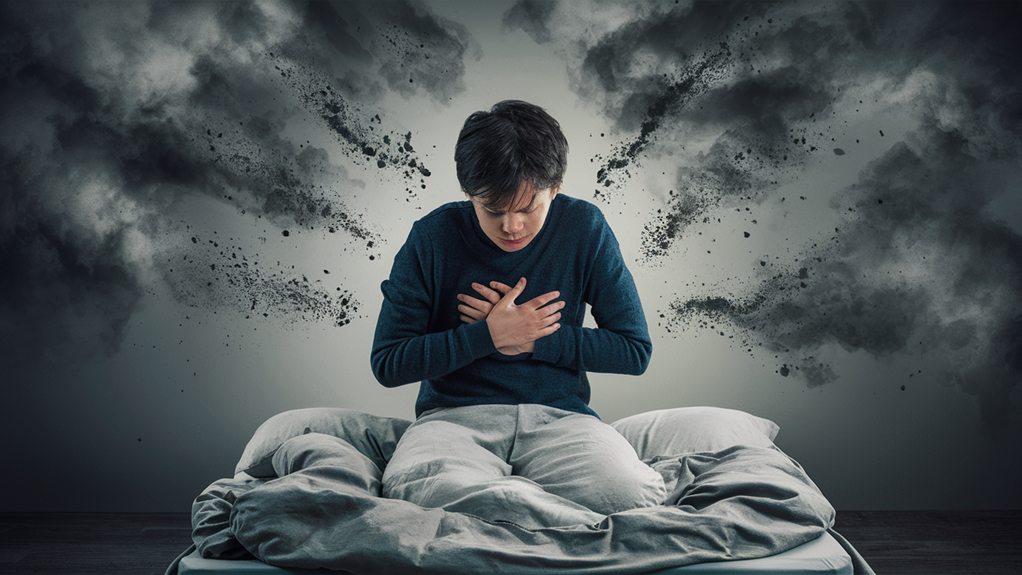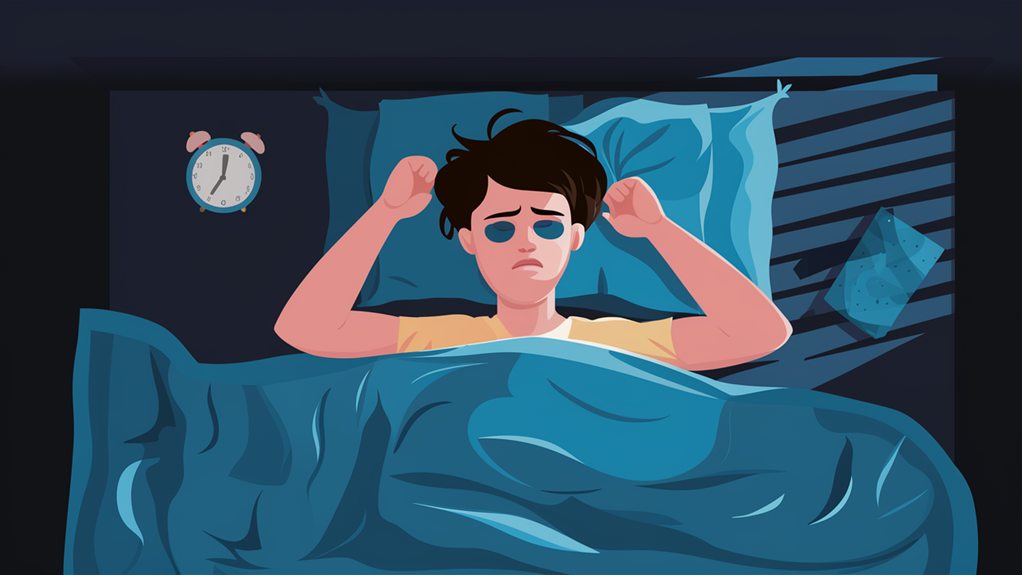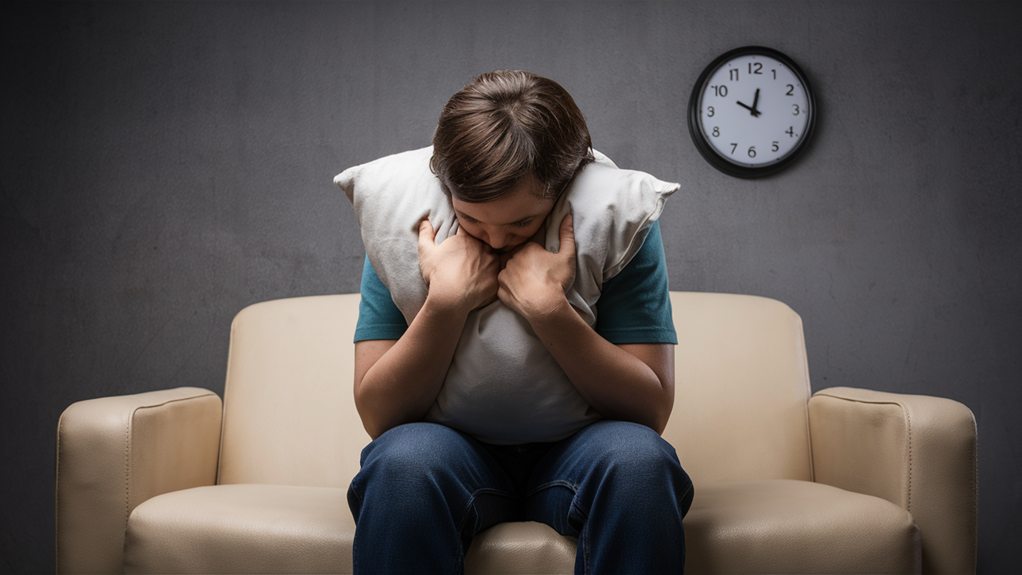You can recognize anxiety through both physical and mental warning signs. Your body may signal anxiety through racing heart, sweaty palms, muscle tension, and shortness of breath, while your mind might experience racing thoughts and constant worry. Watch for behavioral changes like avoiding social situations, increased procrastination, and difficulty with daily tasks. You might notice disrupted sleep patterns, strained relationships, or feeling overwhelmed by simple activities. If these symptoms persist for more than two weeks or greatly impact your life, it's important to seek professional help. Understanding these signs opens the door to better mental health management.
Common Physical Warning Signs

Your body sends clear signals when anxiety takes hold. When you're experiencing symptoms of anxiety, you'll often notice physical changes that can feel overwhelming and intense. Regular exercise can greatly help in managing these symptoms, as it promotes the release of endorphins, which can improve your mood and reduce feelings of anxiety.
Your heart might race or pound in your chest, your palms may become sweaty, and you might feel a tightening sensation in your stomach. Common signs of anxiety can also include muscle tension, especially in your neck and shoulders, along with trembling or shaking in your hands and legs.
You might experience shortness of breath, dizziness, or a feeling of lightheadedness that comes and goes. During anxiety attack symptoms, many people report feeling like they can't catch their breath or might pass out.
Watch for changes in your digestive system too, as anxiety often triggers nausea, stomach cramps, or a general feeling of unease in your gut. You may notice that your mouth feels dry, your body temperature fluctuates, and you're experiencing more headaches than usual.
These physical reactions are your body's natural response to stress, triggering your "fight or flight" response even when there's no immediate danger present. In fact, engaging in regular physical activity can be a powerful way to combat these anxiety symptoms and promote overall wellness the stress-relieving power of exercise.
Behavioral Changes to Watch For
Beyond physical symptoms, anxiety often manifests through noticeable changes in behavior. You might find yourself avoiding social situations you once enjoyed, making excuses to stay home, or struggling to maintain your usual routines. These early signs of anxiety can sneak up gradually, making them easy to dismiss at first.
Understanding anxiety's impact on daily functioning can help you recognize these shifts more clearly.
Watch for changes in your daily habits, such as procrastinating more than usual, having trouble making simple decisions, or constantly seeking reassurance from others. You might notice yourself becoming more irritable with friends and family, or feeling overwhelmed by tasks that didn't bother you before.
Many people also develop new nervous habits, like nail-biting, pacing, or checking things repeatedly.
Your sleep patterns might shift too, with you staying up later to worry or having trouble getting out of bed in the morning. At work or school, you could find it harder to concentrate, meet deadlines, or participate in group activities.
These behavioral changes often serve as warning signals that it's time to check in with yourself and possibly seek support from a mental health professional.
Mental and Emotional Indicators

Most anxiety disorders come with distinct mental and emotional warning signs that can feel overwhelming and persistent. You might notice that your thoughts are racing, jumping from one worry to another, making it hard to focus on daily tasks or conversations.
If you're experiencing anxiety, you'll often find yourself imagining worst-case scenarios, even when there's little reason for concern. Engaging in specific techniques like breathing exercises can help manage these overwhelming thoughts and soothe your nervous system.
You may feel a constant sense of dread or impending doom, as if something bad is about to happen at any moment. Many people with anxiety report feeling detached from reality, almost like they're watching themselves from outside their body.
You'll likely notice that you're more irritable than usual, snapping at loved ones over small things that wouldn't normally bother you.
Another common indicator is difficulty making decisions, even about simple things like what to eat or wear. Your mind might feel cloudy or unfocused, and you could experience intense feelings of self-doubt or worthlessness.
These symptoms often create a cycle where worrying about your anxiety actually makes the anxiety worse.
Social Impact and Relationships
The ripple effects of anxiety often extend far beyond personal thoughts and emotions, greatly impacting social connections and daily interactions. You might notice yourself pulling away from friends and family, making excuses to avoid social gatherings, or struggling to maintain meaningful conversations when you're feeling anxious.
Additionally, certain dietary choices can influence your anxiety levels, as some foods may exacerbate symptoms while others can help with foods that impact anxiety levels.
Your relationships can become strained as you find it harder to express your feelings, share personal experiences, or engage in group activities. At work or school, you'll often feel overwhelmed during team projects, presentations, or casual lunch breaks with colleagues.
Even simple tasks, like answering the phone or responding to text messages, can feel intimidating when anxiety takes hold.
You might also notice that you're second-guessing your social interactions, replaying conversations in your head, and worrying about what others think of you. These concerns can lead to a cycle where you're constantly on edge in social situations, making it difficult to form new relationships or nurture existing ones.
Your desire to avoid uncomfortable situations might cause you to miss important events, decline invitations, or limit your social circle to just a few trusted individuals.
Sleep and Rest Patterns

Nearly every aspect of your sleep can be affected when anxiety takes hold, from falling asleep to maintaining restful slumber throughout the night. When you're dealing with anxiety, your mind might race with worries just as you're trying to drift off, making it frustratingly difficult to relax and unwind.
Poor sleep quality can further exacerbate anxiety symptoms, creating a vicious cycle that can leave you feeling overwhelmed and drained. Enhancing Sleep is essential for managing anxiety effectively.
You'll likely notice several changes in your sleep patterns when anxiety is present:
- Tossing and turning for extended periods before falling asleep, often spending an hour or more trying to quiet your thoughts
- Waking up frequently throughout the night, particularly during times of heightened stress or worry
- Experiencing vivid, unsettling dreams that can disrupt your sleep cycle and leave you feeling unrested
- Waking up earlier than intended and struggling to fall back asleep, even when you're still tired
These disruptions can create a challenging cycle, as poor sleep often intensifies anxiety symptoms during the day.
You might find yourself feeling more irritable, having difficulty concentrating, or experiencing physical fatigue. It's important to recognize these changes in your sleep patterns, as they're often one of the earliest indicators that your anxiety levels are rising.
Daily Life Disruptions
Anxiety can spill over into multiple areas of your daily routine, making even simple tasks feel overwhelming. You might notice that running errands, which were once quick and easy, now require significant mental preparation and energy. This can be exacerbated by underlying factors such as the multifactorial causes of depression, where environmental stressors and life events can intertwine with anxiety symptoms.
Even activities like grocery shopping or meeting friends for coffee can trigger waves of unease and worry.
At work or school, you'll likely find it harder to concentrate on assignments, and your productivity might suffer as racing thoughts compete for your attention. Simple decisions, such as choosing what to wear or what to eat, can become drawn-out processes filled with second-guessing and doubt.
You may also find yourself avoiding social situations, canceling plans last minute, or creating elaborate excuses to skip events you'd normally enjoy.
Your relationships might strain as you struggle to maintain regular social connections, and you'll often catch yourself overthinking conversations or interactions that others would consider routine.
Daily tasks like driving, attending meetings, or making phone calls can become sources of intense stress, leading you to create alternative routines that feel safer but limit your usual activities.
When to Seek Help

Recognizing the right time to seek professional help can feel like maneuvering through fog, but certain warning signs should prompt immediate action.
When your anxiety begins to overwhelm your daily functioning, it's essential to understand that reaching out isn't a sign of weakness, but rather a step toward better mental health.
You'll want to contact a mental health professional if you notice any of these persistent signs:
- Your anxiety interferes with work, school, or relationships for more than two weeks
- You're experiencing physical symptoms like constant chest pain, rapid heartbeat, or trouble breathing
- You've started avoiding social situations or activities you once enjoyed
- Your sleep patterns have noticeably changed, and you can't seem to rest properly
Don't wait until you're in crisis to seek help, as early intervention can make a considerable difference in your recovery journey.
You can start by talking to your primary care physician, who'll guide you toward appropriate mental health resources.



